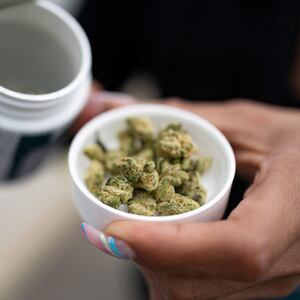Think that smoking marijuana cigarettes is all fun and games? Well, think again.
A new study published Tuesday in the Journal of Studies on Alcohol and Drugs found that states that legalized recreational pot saw increases in traffic crashes and fatalities. In fact, there was a 5.8 percent increase in traffic crash injuries and a 4.1 percent increase in fatal crashes in states that legalized recreational marijuana for adults age 21 and older. Meanwhile, there was no increase in states that didn’t legalize the drug in the same time frame.
“The legalization of marijuana doesn’t come without cost,” Charles Farmer, a researcher for the Insurance Institute for Highway Safety and lead author of the study, said in a press release.
He added that while legalization increased access to pot, it’s still easily attained “even in places without retail sales.” What legalization might be doing, the authors speculate, is allowing users who would otherwise not drive high, “feel that it’s okay after legalization.”
The study took a look at traffic data from the Federal Highway Administration from 2009 to 2019 from 11 states—five that had legalized recreational marijuana during the study period (Colorado, Washington, Oregon, California, and Nevada), and five that had not (Arizona, Idaho, Montana, New Mexico, Utah, and Wyoming). The authors discovered that traffic injury rates varied pretty broadly, with Colorado experiencing the biggest spike at 17.8 percent and California experiencing the smallest at 5.7 percent.
Meanwhile, Nevada—a state that did not legalize weed—actually saw a 6.7 percent decrease in car-related injuries.
This latest study underscores a point that many researchers have been inching closer to as countries begin to grapple with the full impact of legalization: Maybe, just maybe, marijuana might be a little bad for us, actually. In June, a similar study found that pot users visited the emergency room or were hospitalized 22 percent more than those who didn’t use weed. In all, this pushes against commonly held notions that marijuana is a “safer” drug.
Like the June study, though, Farmer stresses that the findings are correlational—meaning that increased pot use likely isn’t the only reason for the increase in traffic casualties.
“Studies looking for a direct causal link between marijuana use and crash risk have been inconclusive,” he said. “Unlike alcohol, there is no good objective measure of just how impaired a marijuana user has become. Until we can actively measure marijuana impairment, we won’t be able to link it to crash risk.”
The study’s authors now hope that states that are considering weed legalization ensure that there are laws and regulations barring driving under the influence of marijuana, and that those sanctions are strictly enforced.
All this might be harshing the mellow of any pot enjoyer out there. But it’s important to note that we’re not saying that you should never smoke weed—but you should definitely leave the bong at home before you head out for a drive. It could end up saving your life.







